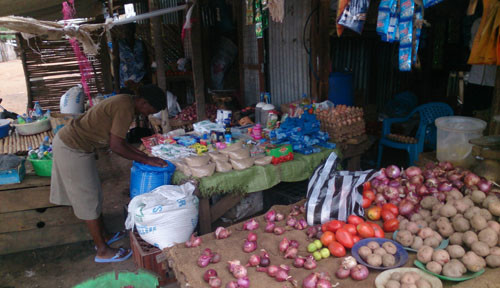Rumbek Municipality Mayor Andrew Mangui Mading issued a provisional order reducing food prices last weekend. But traders say the order is not practical as the local currency remains depreciated.
According to the Mayor, all traders were notified to revert to the prices before the price of the United States Dollar shot up. All in violation of the order will be subject to a fine of 5,000 SSP and or one month in jail.
“There is no need again of keeping prices high while the dollar has dropped,” Mangui Mading said, “All food items listed will be sold at the current prices and should be reviewed after every seven days by the municipal council authority with effect from the 24th October 2020.”
Mayor Mangui Mading said the price of 50 Kg maize flour has been reduced from the current price of 17,000 to 16,000 SSP, 50 Kg of Azam baking floor from 22,500 to 21,000, 50 Kg of Sugar from 22,000 to 21,000, a carton of soap from 7,000 to 6,500, 25kg of rice from 11,000 to 10,000, a jerrycan of cooking oil from 18,000 to 15,000 and 50 kg of beans from 35,000 to 33,000 SSP while powder dropped from 48,000 SSP to 46,000 SSP.
A Sudanese businessman dealing in food items, Saleh Edin Abdelrahman, said that they are still selling first-class maize flour at between 20,000-19,000 SSP while the second class maize flour sold at 19,000-18,000 SSP.
“We also sell Azam baking floor at 22,000, white sugar at 24,000, while brown sugar is 22,000 SSP,” Saleh Eldin Abdelrahman said.
He appealed to the mayor to convene another meeting to discuss the issue of high prices in the market.
Omer Mohamed said there is no way they can reduce the price of maize flour to 17,000 SSP per 50 Kg while the dollar price is still at 55,000 SSP.
“When you ask some selling a dollar how much, he will tell you it is 55,000 SSP and if you tell him that the dollar has dropped to 35,000 SSP, he immediately leaves with his dollars to go get another interested person,” Mohammed said. “We also have a problem on the road because of flooding and multiple taxes imposed on the traders carrying goods, plus the money for the loaders and rent for the shops.”
He tasked the government to try and import commodities and witness what traders are going through.
“The government is always complaining that the traders are cheating citizens by selling commodities at high prices in the market but let one of the government agents try to pretend as a trader and buy food items from Kenya and Uganda and see the difference with us as traders.”
South Sudanese citizens have been complaining of hyperinflation for the past three months across the country as the local currency, the South Sudanese pound, has tumbled rapidly.




